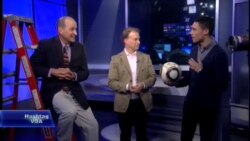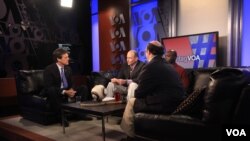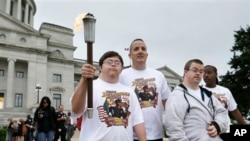As the first-ever Special Olympics Unified Relay Across America makes its way through 50 states, athletes and supporters are running, walking or biking toward Los Angeles for the 2015 World Summer Games.
Special Olympics Chairman Tim Shriver told Hashtag VOA on Tuesday that this year's event, from July 25 through August 2, is leveraging social media to expand the movement. Already, some 5 million athletes compete in at least one Special Olympics event annually.
"Our movement is all about engaging people in thinking differently; engaging people in feeling differently, engaging people in seeing the world differently," Shriver said. "There is nothing like the revolution in social media to help us bring that challenge to people, but also to invite them to share their own the challenge, to invite them to take their own photos of inclusion, to tell their own stories of how they've overcome fears and prejudices."
Some 7,000 athletes from 170 countries will converge on Los Angeles for the July 25 lighting of the cauldron to kick off the games.
"Our message to the country is that we have to play unified to live unified," Shriver said. "We should have Special Olympics unified sports teams in every school in America, having every child with special neeeds playing with their non-disabled peers from first grade right through high school, learning when they're little boys and girls so that we educate a generation to be unified, not have to change a generation from being segregationist or discriminatory to becoming inclusive."
Shriver also discussed ESPN's recently announced decision to air comprehensive coverage of the games. He called that "a big graduation" for the organization founded in 1968 by his mother, Eunice Kennedy Shriver.
"We're getting out of the idea that the Special Olympics is just cute or nice or sweet, and we're finding ourselves on the television network that features sports as courageous and brave and skillful and dramatic and in so many ways captivating," he said.
"If you want to be refreshed on why sport is still worth loving when the headlines in so many organizations are about corruption and cheating and scandals and manipulation, if you want your children to see sports heroes they can look up to and not be afraid that they're going to be disappointed, tune in," Shriver said.
David Egan, the organization's Sargent Shriver International Global Messenger, reiterated the unification theme in the context of cross-cultural outreach.
"[Unified sports] was a great learning experience ... but it's a unifying way of showing universal support," said Egan, a prominent advocate for the intellectually disabled, describing sports as a kind of universal language.
"Special Olympics change my life, and it can change yours. Look at the young athletes program," he said. "You see the joy on their faces. It's for all ages, all abilities. It's a great example for how they can be contributing members of society."
Special Olympian Kester Edwards knows from experience.
"I'm a soldier of the movement," he said.
The Washington-based swimmer, who was instrumental in bringing open water swimming competition to the 2011 World Games in Athens, first engaged sports as a football player in his native Trinidad and Tobago.
"My passion was ignited with the open-water swimming, but now it's about giving back. It's about hope and joy," he said.
After last month’s official torch lighting in Athens, Greece, which hosted the 2011 Special Olympics World Summer Games, the Flame of Hope torch arrived on U.S. soil. Then the relay split into three simultaneous routes starting in Augusta, Maine; Miami, and the nation's capital.
On June 2, Team USA torchbearers along the central route, which kicked off May 26 in Washington, D.C., passed through Kentucky, en route to Ohio.
Participants and supporters can follow the torch relay as it makes its way across the United States at www.unifiedrelay.org and by following #unifiedrelay on Twitter; they can donate to the Special Olympics by texting FLAME to 91999, or visiting @specialolympics on Twitter.








